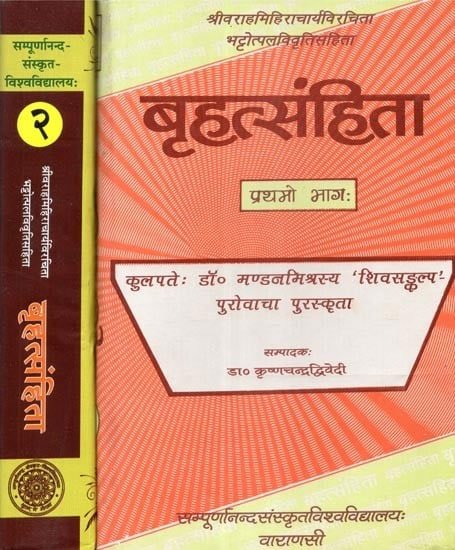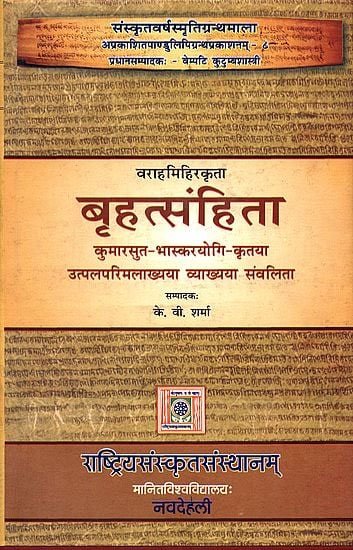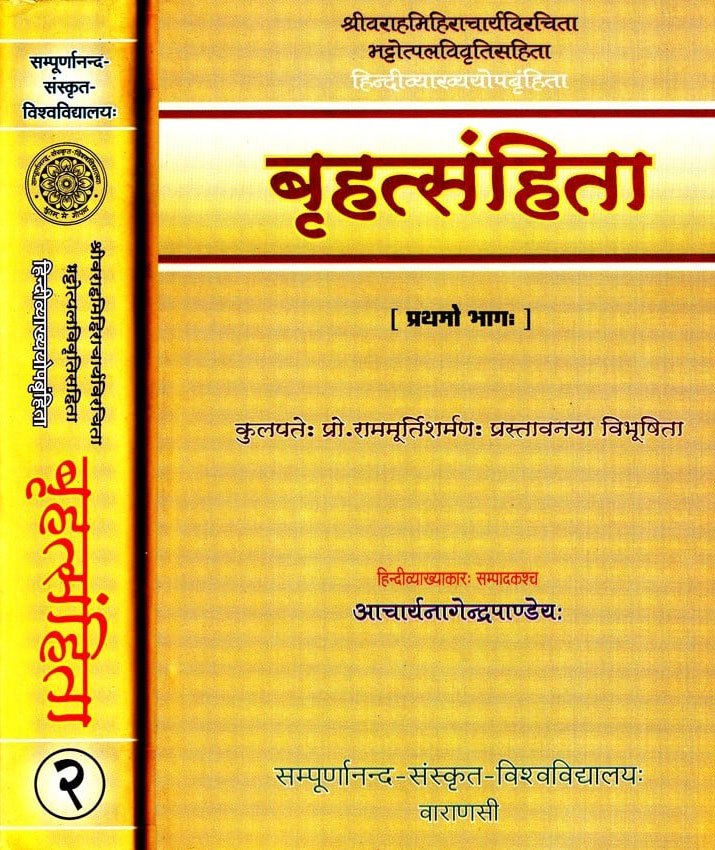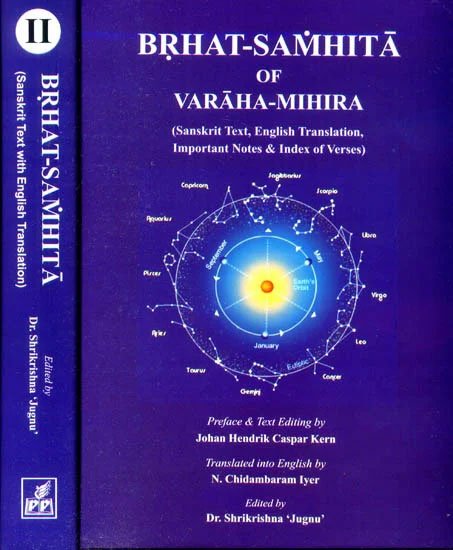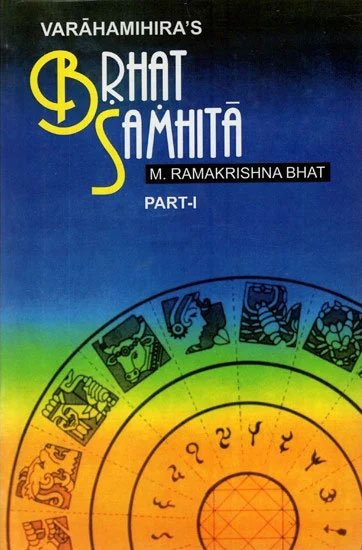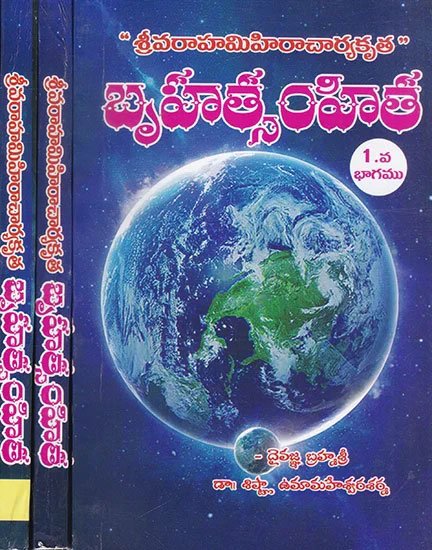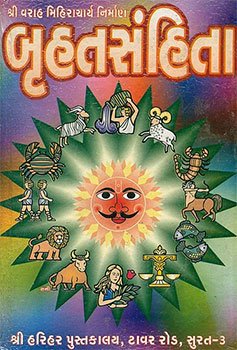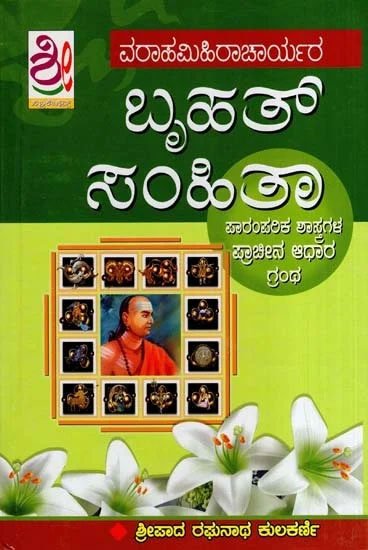Brihat-samhita [sanskrit]
26,560 words
The Sanskrit text of the Brihat-samhita from the 6th-century authored by Varaha Mihira in present-day Ujjain, India. It primarily deals with astrology and astronomy but is presented as an encyclopedia of knowledge.
Verse 94.62
क्रोशादूर्ध्वं शकुन विरुतं निष्फलं प्राहुरेके तत्रानिष्टे प्रथमशकुने मानयेत्पञ्च षट् च ।
प्राणायामान्नृपतिरशुभे षोडशैव द्वितीये प्रत्यागच्छेत्स्वभवनमतो यद्यनिष्टस्तृतीयः ॥ ६२ ॥
[शकुनि]
krośādūrdhvaṃ śakuna virutaṃ niṣphalaṃ prāhureke tatrāniṣṭe prathamaśakune mānayetpañca ṣaṭ ca |
prāṇāyāmānnṛpatiraśubhe ṣoḍaśaiva dvitīye pratyāgacchetsvabhavanamato yadyaniṣṭastṛtīyaḥ || 62 ||
[śakuni]
The Sanskrit text of Verse 94.62 is contained in the book Brihata Samhita (Sanskrit Text with Hindi Translation) by Pandit Achyutananda Jha. This book is available online or you could buy the latest edition:
Read online Buy now! The Sanskrit text by Pandit Achyutananda Jha (2001)
Glossary of Sanskrit terms
Note: This extracts Sanskrit terms and links to English definitions from the glossary, based on an experimental segmentation of verse (94.62). Some terms could be superfluous while some might not be mentioned. Click on the word to show English definitions.
Krosha, Urdhvam, Urdhva, Shakuna, Viruta, Nishphala, Pra, Ahura, Kah, Kim, Tatra, Anishta, Prathama, Shakuni, Panca, Pancan, Shat, Shash, Pranayama, Pati, Ashubha, Shodasha, Shodashan, Dvitiya, Prati, Svabhavana, Atah, Yadi, Yad, Tritiya,
Analysis of Sanskrit grammar
Note: this is an experimental feature and only shows the first possible analysis of the Sanskrit text (Verse 94.62). If the system was successful in segmenting the sentence, you will see of which words it is made up of, generally consisting of Nouns, Pronouns, Verbs, Participles and Indeclinables. Click on the link to show all possible derivations of the word.
- Line 1: “krośādūrdhvaṃ śakuna virutaṃ niṣphalaṃ prāhureke tatrāniṣṭe prathamaśakune mānayetpañca ṣaṭ ca ”
- krośād -
-
krośa (noun, masculine)[adverb], [ablative single]krośa (noun, neuter)[adverb], [ablative single]
- ūrdhvam -
-
ūrdhvam (indeclinable)[indeclinable]ūrdhva (noun, masculine)[adverb], [accusative single]ūrdhva (noun, neuter)[adverb], [nominative single], [accusative single]ūrdhvā (noun, feminine)[adverb]
- śakuna -
-
śakuna (noun, masculine)[compound], [vocative single]śakuna (noun, neuter)[compound], [vocative single]
- virutam -
-
viruta (noun, masculine)[adverb], [accusative single]viruta (noun, neuter)[adverb], [nominative single], [accusative single]virutā (noun, feminine)[adverb]
- niṣphalam -
-
niṣphala (noun, masculine)[adverb], [accusative single]niṣphala (noun, neuter)[adverb], [nominative single], [accusative single]niṣphalā (noun, feminine)[adverb]
- prā -
-
pra (noun, masculine)[compound], [vocative single]pra (noun, neuter)[compound], [vocative single]prā (noun, feminine)[nominative single]
- ahure -
-
ahura (noun, masculine)[locative single]
- ke -
-
ka (noun, masculine)[nominative plural]ka (noun, neuter)[nominative dual], [vocative dual], [accusative dual], [locative single]kaḥ (pronoun, masculine)[nominative plural]kim (pronoun, neuter)[nominative dual], [accusative dual]kā (pronoun, feminine)[nominative dual], [accusative dual]
- tatrā -
-
tatra (indeclinable adverb)[indeclinable adverb]tatra (indeclinable correlative)[indeclinable correlative]tatra (indeclinable)[indeclinable]
- aniṣṭe -
-
aniṣṭa (noun, masculine)[locative single]aniṣṭa (noun, neuter)[nominative dual], [vocative dual], [accusative dual], [locative single]aniṣṭā (noun, feminine)[nominative dual], [vocative single], [vocative dual], [accusative dual]
- prathama -
-
prathama (noun, masculine)[compound], [vocative single]prathama (noun, neuter)[compound], [vocative single]
- śakune -
-
śakuna (noun, masculine)[locative single]śakuna (noun, neuter)[nominative dual], [vocative dual], [accusative dual], [locative single]śakuni (noun, masculine)[vocative single]
- mānayet -
-
√mān (verb class 10)[optative active third single]√man (verb class 0)[optative active third single]
- pañca -
-
pañca (noun, masculine)[compound], [vocative single]pañca (noun, neuter)[compound], [vocative single]pañcan (noun, masculine)[compound]pañcan (noun, neuter)[compound], [adverb], [nominative single], [accusative single]√pañc (verb class 1)[imperative active second single]
- ṣaṭ -
-
ṣaṭ (indeclinable)[indeclinable]ṣaṣ (noun, masculine)[compound], [adverb], [nominative single], [vocative single]ṣaṣ (noun, neuter)[compound], [adverb], [nominative single], [vocative single], [accusative single]
- ca -
-
ca (indeclinable conjunction)[indeclinable conjunction]ca (noun, masculine)[compound], [vocative single]ca (noun, neuter)[compound], [vocative single]
- Line 2: “prāṇāyāmānnṛpatiraśubhe ṣoḍaśaiva dvitīye pratyāgacchetsvabhavanamato yadyaniṣṭastṛtīyaḥ || 62 |”
- prāṇāyāmānn -
-
prāṇāyāma (noun, masculine)[accusative plural]
- ṛ -
-
ṛ (noun, feminine)[compound], [adverb]ṛ (noun, masculine)[compound], [adverb]
- patir -
-
pati (noun, feminine)[nominative single]pati (noun, masculine)[nominative single]
- aśubhe -
-
aśubha (noun, masculine)[locative single]aśubha (noun, neuter)[nominative dual], [vocative dual], [accusative dual], [locative single]aśubhā (noun, feminine)[nominative dual], [vocative single], [vocative dual], [accusative dual]√śubh (verb class 6)[imperfect middle first single]
- ṣoḍaśai -
-
ṣoḍaśa (noun, masculine)[compound], [vocative single]ṣoḍaśa (noun, neuter)[compound], [vocative single]ṣoḍaśan (noun, masculine)[compound], [nominative single]ṣoḍaśan (noun, neuter)[compound], [adverb], [nominative single], [vocative single], [accusative single]
- aiva -
-
√i (verb class 2)[imperfect active first dual]
- dvitīye -
-
dvitīya (noun, masculine)[locative single]dvitīya (noun, neuter)[nominative dual], [vocative dual], [accusative dual], [locative single]dvitīyā (noun, feminine)[nominative dual], [vocative single], [vocative dual], [accusative dual]
- pratyā -
-
pratī (noun, masculine)[nominative dual], [vocative dual], [accusative dual], [instrumental single]pratī (noun, feminine)[instrumental single]pratyā (Preverb)[Preverb]
- gacchet -
-
√gam (verb class 1)[optative active third single]
- svabhavanam -
-
svabhavana (noun, masculine)[adverb], [accusative single]svabhavana (noun, neuter)[adverb], [nominative single], [accusative single]
- ato* -
-
ataḥ (indeclinable)[indeclinable]
- yadya -
-
yadi (indeclinable conjunction)[indeclinable conjunction]yadi (indeclinable relative)[indeclinable relative]yadi (indeclinable)[indeclinable]yad (noun, masculine)[locative single]
- aniṣṭas -
-
aniṣṭa (noun, masculine)[nominative single]
- tṛtīyaḥ -
-
tṛtīya (noun, masculine)[nominative single]
- Cannot analyse 62
Other editions:
Also see the following editions of the Sanskrit text or (alternative) English translations of the Verse 94.62
Brhatsamhita with the Commentary of Bhattotpala
by Krishna Chandra Dwivedi (2016)
Publisher: Sampurnanand Sanskrit University; 1229 pages;
Buy now!
Brihat Samhita with the Commentary of Utpalapatimala of Yogisvara
by K. V. Sharma (2012)
Publisher: Rashtriya Sanskrit Sansthan, Janakpuri; 754 pages; ISBN-10; 8186111360; ISBN-13: 9788186111369
Buy now!
Brihat Samhita (Hindi Translation)
by K. V. Sharma (2002)
Publisher: Sampurnanand Sanskrit University; 2359 pages; ISBN-13: 9789387890008.
Buy now!
Brhat Samhita (English translation)
by N. Chidambaram Iyer (2022)
Publisher: Parimal Publication Pvt. Ltd.; 801 pages; Edited by Dr. Shrikrishna Jugnu; ISBN-10: 8171104215; ISBN-13: 9788171104215.
Buy now!
Brhat Samhita (English with notes)
by M. Ramakrishna Bhat (2010)
Publisher: Motilal Banarsidas Publishers Pvt. Ltd.; 1155 pages; ISBN-10: 8120810600; ISBN-13: 9788120810600.
Buy now!
Brhat Samhita (Telugu translation)
by Sishtla Umamaheswara Sharma (2020)
Publisher: Mohan Publications, Andhra Pradesh; 846 pages.
Buy now!Preview of verse 94.62 in Kannada sript:
ಕ್ರೋಶಾದೂರ್ಧ್ವಂ ಶಕುನ ವಿರುತಂ ನಿಷ್ಫಲಂ ಪ್ರಾಹುರೇಕೇ ತತ್ರಾನಿಷ್ಟೇ ಪ್ರಥಮಶಕುನೇ ಮಾನಯೇತ್ಪಞ್ಚ ಷಟ್ ಚ ।
ಪ್ರಾಣಾಯಾಮಾನ್ನೃಪತಿರಶುಭೇ ಷೋಡಶೈವ ದ್ವಿತೀಯೇ ಪ್ರತ್ಯಾಗಚ್ಛೇತ್ಸ್ವಭವನಮತೋ ಯದ್ಯನಿಷ್ಟಸ್ತೃತೀಯಃ ॥ ೬೨ ॥
[ಶಕುನಿ]
Brhat Samhita (Gujarati translation)
by - (2000)
Publisher: Shree Harihar Pustakalay, Surat; Author: Shri Varahamihira Acharya (શ્રી વરાહમિહીરાચાર્ય); 432 pages.
Buy now!Preview of verse 94.62 in Gujarati sript:
ક્રોશાદૂર્ધ્વં શકુન વિરુતં નિષ્ફલં પ્રાહુરેકે તત્રાનિષ્ટે પ્રથમશકુને માનયેત્પઞ્ચ ષટ્ ચ ।
પ્રાણાયામાન્નૃપતિરશુભે ષોડશૈવ દ્વિતીયે પ્રત્યાગચ્છેત્સ્વભવનમતો યદ્યનિષ્ટસ્તૃતીયઃ ॥ ૬૨ ॥
[શકુનિ]
Brhat Samhita (Kannada translation)
by Sripada Raghunatha Kulkarni (2021)
Publisher: Srinidhi Publications, Bangalore; 668 pages with illustrations.
Buy now!Preview of verse 94.62 in Kannada sript:
ಕ್ರೋಶಾದೂರ್ಧ್ವಂ ಶಕುನ ವಿರುತಂ ನಿಷ್ಫಲಂ ಪ್ರಾಹುರೇಕೇ ತತ್ರಾನಿಷ್ಟೇ ಪ್ರಥಮಶಕುನೇ ಮಾನಯೇತ್ಪಞ್ಚ ಷಟ್ ಚ ।
ಪ್ರಾಣಾಯಾಮಾನ್ನೃಪತಿರಶುಭೇ ಷೋಡಶೈವ ದ್ವಿತೀಯೇ ಪ್ರತ್ಯಾಗಚ್ಛೇತ್ಸ್ವಭವನಮತೋ ಯದ್ಯನಿಷ್ಟಸ್ತೃತೀಯಃ ॥ ೬೨ ॥
[ಶಕುನಿ]
![Brihat-samhita [sanskrit] - book cover](/uploads/a/Brihat-Samhita-Sanskrit.jpg)
